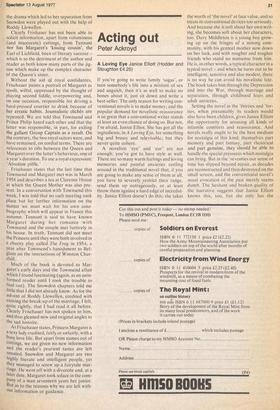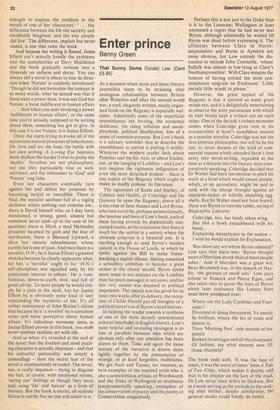Acting out
Peter Ackroyd
A Loving Eye Janice Elliott (Hodder and Stoughton £4.25)
If you're going to write family 'sagas', or turn somebody's life into a mixture of sex and anguish, then it's as well to make no bones about it, just sit down and write a best-seller. The only reason for writing conventional novels is to make money; and the popular demand for novelistic reassurance is so great that a conventional writer stands at least an even chance of doing so. But not, I'm, afraid, Janice Elliot, She has got all the ingredients, in A Loving Eye, for something big and brassy and televisable; but they never quite cohere.
A novelists 'eye' and 'ear' are not enough; you've got to have style as well, There are so many warm feelings and loving memories and painful anxieties rattling around in the traditional novel that, if you are going to make any sense of them at all, you have to severely restrict their range, send them up outrageously, or at least throw them against a hard edge of incredulity. Janice Elliott doesn't do this; she takes the worth of 'the novel' at face value, and so treats its conventional devices too seriously. And because she is soft about her own writing, she becomes soft about her characters, too. Davy Middleton is a young boy growing up on the fringes of a mining community, with his genteel mother now down on her luck, and with rougher and tougher friends who stand no nonsense from him, lie is, in other words, a typical character in a typical novel – and when he turns out to be intelligent, sensitive and also modest, there is no way he can avoid his novelistic fate. The book takes him through the Depression and into the War, through marriage and separation, through childhood fears and adult anxieties.
Setting the novel in the 'thirties and 'forties, when presumably its readers would also have been children, gives Janice Elliott the opportunity for arousing all kinds of infantile comforts and reassurance. And novels really ought to be the best medium for nostalgia of this kind: themselves part memory and part fantasy, part rhetorical and part genuine, they should be able to handle the special pressures which nostalgia can bring. But in the 'seventies our sense of time has slipped beyond repair, as decades are reconstructed and then destroyed on the small screen, and the conventional novel's usual evocation of the past merely seems dumb, The hesitant and broken quality of the narrative suggests that Janice Elliott knows this, too, but she only has the strength to express the problem in the mouth of one of her 'characters': . the difference between the life she secretly and steadfastly imagined, and the way people did live'. The difference, implicit but never stated, is one that ruins the book.
And because her writing is flawed, Janice Elliott can't actually handle the problems and the complexities of Davy Middleton and the book gradually retreats into a threnody on sadness and decay. You can always tell a novel is about to lose its direction when 'Nature' is suddenly introduced: 'Though he did not formulate the concept in so many words, what he sensed was that if there were a power here, it was not God but Nature, a force indifferent to human affairs . '. And when you start invoking a power 'indifferent to human affairs', at the same time you're actually supposed to be writing about them, something has got to give. In this case it is not Nature; it is Janice Elliott.
Once she starts trying to evoke all of the mysterious natural processes of inheritance, life, love and sex she loses the battle with her own writing. A Loving Eye becomes more shallow the harder it tries to probe the 'depths'. Novelists are not philosophers, nor are they particularly wise or wellinformed, and the references to 'God' and 'Nature' ring false.
Even her characters eventually turn against her and defeat her purposes by becoming insipid or incredible. There is Ned, the socialist aesthete full of a raging darkness which nothing can exorcise etc., there is David himself who, as I may have mentioned, is strong, good, sincere but somehow never adds up to the sum of his qualities; there is Illtyd, a mad Methodist preacher haunted by guilt and the fear of retribution; there is Bernard Upward, a dour but sincere schoolmaster whose earthly lot is one of pain. And then there is a novelist, H.N.; he is Janice Elliott's greatest mistake because he clearly represents what, for her, a 'novelist' ought to be: 1-1.N.'s self-absorption was equalled only by his passionate interest in others.' He is rumbustious, down-to-earth, wise, and full of good advice. To most people he would simply be a pain in the neck, but for Janice Elliott he is obviously some kind of seer expounding the mysteries of life. It's all rather reminiscent of John Braine's claims that because he is `a novelist' he is somehow wiser and more perceptive about human affairs. It's ridiculous nonsense since, as Janice Elliott proves in this book, you mat never confuse realistic art with life.
And so when it's revealed at the end of the novel that the liveliest and most puzzling character is actually impotent — and that his colourful personality was simply a camouflage — then the secret fear of the novel is unconsciously revealed. The novel, too, is really impotent — trying to disguise the fact, of course, with emotional scenes, `acting out' feelings as though they were real, using `life' and 'nature' as a form of therapy. But the book is sterile; all realistic fiction is sterile; but no one will admit to it.



































 Previous page
Previous page